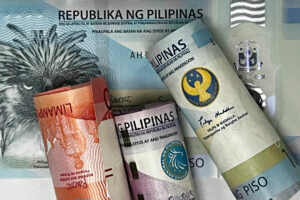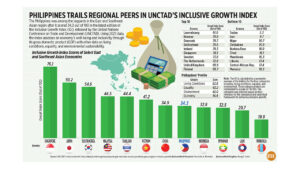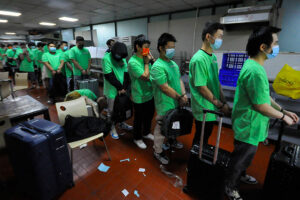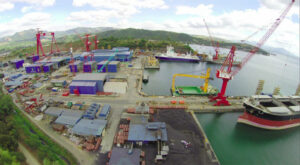Digital transformation in Philippine agribusiness: Lessons from Agro-digitalPH, Kita Agritech, and Benguet Agri-Pinoy
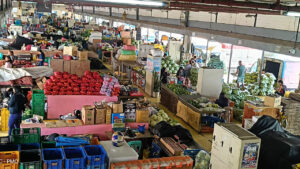
(Part 5)
Another very important aspect of the digitalization of Philippine agribusiness is that which applies to logistics and market access, especially as regards the millions of small farmers most of whom are below the poverty line. Digitalization in logistics is all about reducing costs, minimizing waste, and ensuring fair pricing for farmers, as stressed by Professor Ruel Maningas who chaired the session on Digitalization in Logistics and Market Access at the Forum on Digital Transformation, which examined the role of digital platforms, e-commerce, and supply chain innovations in improving market linkages and streamlining agricultural logistics.
Professor Maningas opened the session by making a distinction between digitalization, digitization, and digital transformation. First, digitalization in logistics and market access consists in leveraging technology to streamline the associated process, achieving real-time visibility, and including data-driven decision-making. Digitization, on the other hand, is more concerned with converting and recording data into a digital format. Finally, digital transformation is the integration of digital technology into the business process and operations. The ultimate goal of digital transformation is to deliver value to the customer.
The first speaker on the panel was Henry James Sison of Agro-digitalPH, a social enterprise working with smallholder farmers and fisherfolk. Mr. Sison opined that his organization was invited to the Forum to talk about logistics because in addition to being a digital platform, Agro-digitalPH has become a coordinator. It is like a ride-sharing application in that it facilitates its partner cooperatives and other associations to get their products to the market by partnering with larger cooperatives who have the trucks or the logistics to get their goods from point A to point B. Since cold storage is scarce in rural areas, delivery of the products of the small farmers has to be “just on time.” At a pre-determined time, the goods of the small farmers that are delivered come in at 4 a.m. and must reach their final destination by 10 a.m. The daily turnover is about 10 to 15 tons.
As a social enterprise, Agro-digitalPH aims at business sustainability, ploughing back most of the profits generated by its business to the community partners who get involved in logistics. Some of these partners are able to buy their own trucks which are used to deliver the vegetables whose prices are kept as low as possible in exchange for the use of the trucks, resulting in a good trade-off.
In some areas, local government units provide assistance by, among others, building cold storage facilities. It is important to point out that this model illustrates the importance of a partnership between social enterprises (or NGOs) and the LGUs in helping small farmers break out of poverty by addressing the problem of access to markets. As in the case of Mayani, it is access to market information and, as in other cases to be discussed further on, access to credit. As Mayani’s CEO JT Solis emphasized, “We think that the job of the government is really to provide an enabling environment for the private sector to thrive alongside civil society organizations and other sectors of society. In this case, whenever we do consultation, the ideal model is a harmonized consultation between the local government and the private business sector and the civil society organizations.” To many of these rural small holders, growers, and producers, Government means local government units (LGUs).
According to Mr. Solis, he recently led a team from his company to Leon, Batangas where they met for consultation with small farm holders. The group realized that the officials (Mayor, Vice-Mayor, and kagawad or deputies) are always present. The Government plays a very important role in harmonizing the activities of the various sectors. And, as mentioned above, resource sharing is facilitated if the LGU is able to work with the Department of Agriculture in the common use of trucks that experience downtime because of glut or oversupply.
Another model discussed during the Forum was that of Kita Agritech, represented by Marc Concio. Kita services some of the biggest hotels, restaurants, and retailers, one of which is the retailing giant SM Supermarkets that is at the same time a major investor. Realizing that there is a tendency in the supply chain for the small farmers to be “squeezed,” Kita Agritech decided to rethink its business model in order to promote the welfare of the small farmers. The following facts stood out:
1.) Very expensive financing. There are about 5 million small farmers in the Philippines and most of them are not able to have access to credit from banks and not even from fintechs. Most of them rely on informal lenders who charge 5% to 10% monthly interest. This presents a huge opportunity for more socially conscious lenders.
2.) Very expensive inputs. There are many layers of middlemen before such inputs as fertilizers, pesticides, seeds, etc. can reach the small farmers.
3.) Difficult access to market.
4.) Volatility in pricing.
“We took cognizance of the fact that farmers sell their produce at the trading post: characterized by a huge market where payment is on cash basis, without official receipts, and which is highly inefficient,” Mr. Concio said. “One way we tried to solve the problem was to digitize the Benguet Agri-Pinoy Trading Center, which is the largest trading post in the entire Philippines, servicing around 100,000 farmers in Benguet. Digitizing trading posts capture all the transactions and sales of each farmer at the trading post, through truck weighing scales and AI CCTVs.” Through these digital technologies, Mr. Concio reported, “We know in real time how much each farmer is selling at the trading post. For example, this farmer Juan de la Cruz sold P30,000 worth of carrots at exactly 7:30 a.m. We capture that data, and guess what? We share it with LANDBANK with whom we have a partnership. LANDBANK can now lend to the individual farmer at a low of 4% yearly interest. Previously, the same farmer borrowed at 120%. Just imagine the benefit to the farmer of this form of digitization.”
Another positive result of the partnership between Benguet Agri-Pinoy and LANDBANK is the more productive use of the loan proceeds. The sad reality is that whatever is lent directly to the farmer by the bank may not all be used for productive purposes. The farmer’s family is always under pressure to use the loan proceeds for urgent consumption needs. Through the partnership with LANDBANK, 80% of the loan proceeds are converted into credits in the platform of the enterprise. The farmer can have access to this platform only for funds that are directly used as agri-inputs. Another benefit is that the loans are based on guarantees on the bases of wholesale prices, which are much lower than retail prices.
This is accomplished through consolidation. For example: 100,000 farmers may be selling at the Benguet trading post. Benguet Agri-Pinoy consolidates all their agri-input requirements and buys these directly from the manufacturer or national distributor. The individual farmer then picks up his input requirement at the trading post. There are no logistics costs. There is no need to invest in warehousing, trucks, and other transport costs. The farmer picks up his required supplies after selling his fresh produce at the trading post. He uses his credits from LANDBANK.
As noted by Mr. Concio, theirs is the first attempt to digitize a trading post in Southeast Asia. Benguet Agri-Pinoy is now in talks with MasterCard to replicate their model in India. It is surprising that none of the trading posts are digitized in Japan, a world’s leader in IR 4.0. Mr. Concio is deservedly proud of the fact that their digitization of the Baguio trading post is the first of its kind in Southeast Asia. This lends support to the efforts of our IT people to advance as far as possible in the so-called Industrial Revolution 4.0, even if we still have to complete important stages of the first three Industrial Revolutions.
Unlike President Donald Trump and his advisers, we need not lament unnecessarily our lagging behind in manufacturing, as compared to our East Asian neighbors, as long as we are doing everything possible in our efforts at digital transformation, digitalization, and digitization of the various sectors of our economy, starting with agribusiness.
(To be continued.)
Bernardo M. Villegas has a Ph.D. in Economics from Harvard, is professor emeritus at the University of Asia and the Pacific, and a visiting professor at the IESE Business School in Barcelona, Spain. He was a member of the 1986 Constitutional Commission.
